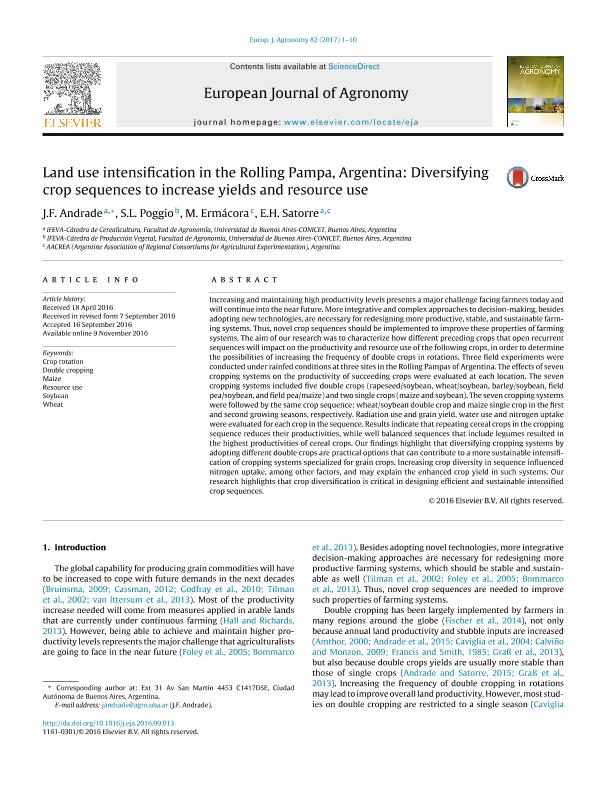Artículo
Land use intensification in the Rolling Pampa, Argentina: Diversifyingcrop sequences to increase yields and resource use
Fecha de publicación:
11/2016
Editorial:
Elsevier Science
Revista:
European Journal of Agronomy
ISSN:
1161-0301
Idioma:
Inglés
Tipo de recurso:
Artículo publicado
Clasificación temática:
Resumen
Increasing and maintaining high productivity levels presents a major challenge facing farmers today and will continue into the near future. More integrative and complex approaches to decision-making, besides adopting new technologies, are necessary for redesigning more productive, stable, and sustainable farming systems. Thus, novel crop sequences should be implemented to improve these properties of farming systems. The aim of our research was to characterize how different preceding crops that open recurrent sequences will impact on the productivity and resource use of the following crops, in order to determine the possibilities of increasing the frequency of double crops in rotations. Three field experiments were conducted under rainfed conditions at three sites in the Rolling Pampas of Argentina. The effects of seven cropping systems on the productivity of succeeding crops were evaluated at each location. The seven cropping systems included five double crops (rapeseed/soybean, wheat/soybean, barley/soybean, field pea/soybean, and field pea/maize) and two single crops (maize and soybean). The seven cropping systems were followed by the same crop sequence: wheat/soybean double crop and maize single crop in the first and second growing seasons, respectively. Radiation use and grain yield, water use and nitrogen uptake were evaluated for each crop in the sequence. Results indicate that repeating cereal crops in the cropping sequence reduces their productivities, while well balanced sequences that include legumes resulted in the highest productivities of cereal crops. Our findings highlight that diversifying cropping systems by adopting different double crops are practical options that can contribute to a more sustainable intensification of cropping systems specialized for grain crops. Increasing crop diversity in sequence influenced nitrogen uptake, among other factors, and may explain the enhanced crop yield in such systems. Our research highlights that crop diversification is critical in designing efficient and sustainable intensified crop sequences.
Palabras clave:
CROP ROTATION
,
DOUBLE CROPPING
,
MAIZE
,
RESOURCE USE
,
SOYBEAN
,
WHEAT
Archivos asociados
Licencia
Identificadores
Colecciones
Articulos(IFEVA)
Articulos de INST.D/INV.FISIOLOGICAS Y ECO.VINCULADAS A L/AGRIC
Articulos de INST.D/INV.FISIOLOGICAS Y ECO.VINCULADAS A L/AGRIC
Citación
Andrade, José Francisco; Poggio, Santiago Luis; Ermacora, Mario Roberto; Satorre, Emilio Horacio; Land use intensification in the Rolling Pampa, Argentina: Diversifyingcrop sequences to increase yields and resource use; Elsevier Science; European Journal of Agronomy; 82; Part A; 11-2016; 1-10
Compartir
Altmétricas




